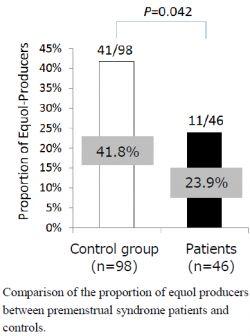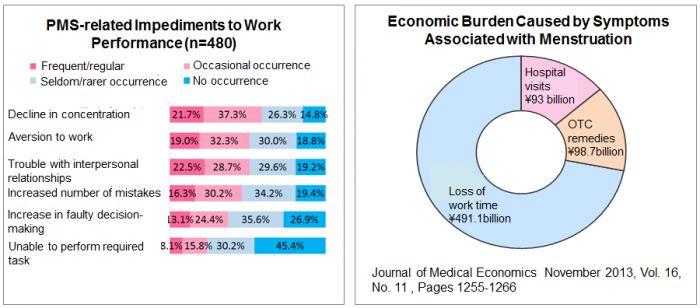A comparison of the characteristics of both groups revealed that members of Group P were younger than Group C (33.1±7.1 vs 35.8±6.6; P=0.023). Group P also had more severe dysmenorrhea (P<0.001), were more susceptible to allergies (P=0.006), and less likely to eat tofu than the members of the control group (P=0.038). The proportion of equol-producers was 41.8% in Group C and 23.9% in Group P, a significantly lower prevalence for Group P (P=0.042). Examination of risk factors using univariate analysis indicated that being a PMS patient and being younger were significant risk factors for equol non-producers. Using a multivariate analysis, being a PMS/PMDD patient was shown to be a significant risk factor for being an equol non-producer (OR, 2.342; 95%CI, 1.021-5.698). Significant risk factors identified for PMS/PMDD included being an equol non-producer, being young, suffering from dysmenorrhea, and allergies. Equol non-producers showed a 2.387 times higher risk of PMS/PMDD than equol-producers (OR, 2.387; 95%CI, 1.009-6.011).
Otsuka Pharmaceutical Co., Ltd.
Relationship between PMS/PMDD and production status of soy isoflavone metabolite equol Presentation to the Japan Society for Menopause and Women's Health
- The world's first study on the relationship between premenstrual syndrome (PMS) *1/premenstrual dysphoric disorder (PMDD)*2 and equol production status
- Compared to equol producers, equol non-producers showed a 2.4 times greater risk of PMS/PMDD
- Further research into equol*3 and its effects may contribute to enhanced quality of life (QOL) for women
The Otsuka Pharmaceutical (Head office: Tokyo, Japan; President: Tatsuo Higuchi) Saga Nutraceuticals Research Institute and the Kindai University Research Institute of Traditional Asian Medicine (Headquarters: Osaka, Japan; Director: Takashi Takeda) have announced the results of joint research confirming the relationship between PMS/PMDD and equol production status. The research results were presented at the 31st annual meeting of the Japan Society for Menopause and Women's Health on November 5, 2016.
Results of the research were also published in Volume 42, Issue 11 of The Journal of Obstetrics and Gynaecology Research in November 2016 (online as of 27 October, 2016).
This study compared the proportion of equol producers and equol non-producers among a group of women receiving treatment for PMS/PMDD and a control group of women who were not receiving treatment. Results revealed a lower proportion of equol producers among women receiving treatment for PMS/PMDD; compared to equol producers, equol non-producers showed a 2.4 times higher risk of being a PMS/PMDD patient. This is the first study to refer to the relation between PMS/PMDD and equol-production status.
According to Takashi Takeda, Director of the Kindai University Research Institute of Traditional Asian Medicine, "Malaise caused by hormone fluctuations affects the quality of life for many women. It is vital for women to gain an accurate understanding of their own physiologies in order to develop methods to cope. By clarifying the relation between soy isoflavone metabolite equol and PMS/PMDD, in addition to recognized beneficial effects for post-menopausal women, we can also expect an expanded number of choices for women of reproductive age to cope with problematic PMS/PMDD. Into the future, we will continue to engage in research to resolve women's health issues and contribute to enhanced quality of life for women of all ages."
- 1PMS(Premenstrual Syndrome): Many women are subject to mood, behavioral, and physical symptoms for one or two weeks before their menstrual period, with symptoms usually resolved a few days after the start of menstruation. Physical symptoms may include water retention, abdominal swelling and sensitive breasts; mood and behavioral symptoms may include depression, irritation, drowsiness, lack of energy, overeating or anorexia). The type and severity of symptoms vary, but it up to 80% of women of reproductive age report some symptoms preceding menstruation.
- 2PMDD(Premenstrual Dysphoric Disorder): A severe form of PMS in which mood or behavioral symptoms may interfere with relationships and participation in work, school, or family life.
- 3Equol: A soy metabolite that is converted from the isoflavone daidzein by intestinal bacteria.
31st Annual Meeting of the Japan Society for Menopause and Women's Health
- Title
- Relation between premenstrual syndrome and equol-production status
- Presenters
- Takeshi Takeda1(0801127, Tomomi Ueno2(0906020), Shigeto Uchiyama, 2(0006053, Masami Shiina 1(99)
- Affiliations
- 1 Kindai University Research Institute of Traditional Asian Medicine; 2 Saga Nutraceuticals Research Institute of Otsuka Pharmaceutical Co., Ltd.
Aim
Premenstrual syndrome (PMS) and premenstrual dysphoric disorder (PDD) are comprised of a range of mood, behavioral, and physical symptoms experienced by women before their menstrual period, which can significantly affect the quality of life. Producers of soy isoflavone metabolite equol are believed to benefit from reduced risk of menopausal symptoms, breast cancer and other estrogen-related diseases. As clear evidence of the association between equol production status and PMS/PMDD is lacking, this study was conducted to evaluate the relation.
Methods
The study was conducted with the approval of the institutional review board of Kindai University School of Medicine.
Study participants included 46 Japanese patients being treated for PMS/PMDD (Group P) and a control group of 98 Japanese women of reproductive age (Group C). Group C subjects were recruited from the public at large, based on inclusion criteria of regular menstrual periods (25-38 days); not receiving therapy for PMS; and not taking oral contraceptive pills. Equol-production status was determined by a soy challenge test, in which the equol concentration in urine samples was measured and evaluated by high performance liquid chromatography.
Results

Conclusion
Our data showed a relation between PMS/PMDD and equol-production status in Japanese women.
Reference Material
Background of the Study
Along with extending healthy life expectancy and fostering an environment that encourages active roles for women, resolution of women's health issues is increasingly the focus of initiatives undertaken by government and private organizations.
Among the issues affecting women's health are menopausal symptoms caused by long-term fluctuations in hormone levels and PMS, attributed to short-term fluctuations during the course of the menstrual cycle.
A survey undertaken by the Hormone Care Promotion Project*4 indicated that approximately 50% of women reported that work and personal relationships were adversely affected by PMS-related conditions, with respondents citing impediments such as diminished concentration or an increased number of mistakes.
A separate survey*5 calculated that the economic burden of premenstrual or menstrual-related symptoms. Decreased productivity, workplace absences, and other work-related losses were calculated at 491.1 billion yen.
Resolution of women's health issues would contribute to solutions for many other issues that affect society at large.
- 4Hormone Care Promotion Project survey, December 2014; 480 women, aged 35-59
- 5Journal of Medical Economics; November 2013, Vol. 16, No. 11, Pages 1255-1266

About Equol
Equol is a metabolite that is converted from the soy isoflavone daidzein by intestinal bacteria. Produced in the gut after consumption of soy, equol as an estrogen receptor binder reproduces some of the effects of the weaker female hormones (estrogen). Thus it is expected that consumption of soy or soy isoflavones can contribute to promotion and maintenance of women's health. The proportion of the population with the ability to produce equol is approximately 50% in Japan, China, and other Asian areas where soy is a dietary staple, while approximately 30% of Caucasian populations*6 are equol-producers. This means that even regular soy consumption does not necessarily assure the benefits of equol. For individuals who are equol non-producers, consumption of foods containing equol may be beneficial.
- 6Journal of the Japan Society for Menopause and Women's Health, 20: 313-332, 2012
Overview of Research Facilities
Otsuka Pharmaceutical Saga Nutraceuticals Research Institute
Based on our corporate philosophy of, "Otsuka-people creating new products for better health worldwide," Otsuka Pharmaceutical strives to create innovative, original products to contribute to the health and well-being of people everywhere. As a total health-care company, we focus on two core businesses: pharmaceuticals for providing breakthrough treatments for patients around the world, and nutraceuticals*7 to help healthy people become even healthier.
The Saga Nutraceuticals Research Institute was established in 1984 as Japan's first private research institute for clinical exercise and nutrition. The Institute continues to implement a wide range of studies to address various health issues, with a primary focus on exercise and nutrition. In the course of long-term research into the benefits of soy, realization of the relationship between equol and fluctuations in women's mental and physical condition led to initiation of equol-related research in 1996. In the intervening decades, the Saga Nutraceuticals Research Institute has become a world leader in equol-related research, producing a variety of studies regarding the safety and efficacy of equol.
- 7Nutraceuticals: Nutrition + pharmaceuticals
Kindai University Research Institute of Traditional Asian Medicine
Inauguration of the Research Institute of Traditional Asian Medicine, under the direct supervision of Kindai University, coincided with the establishment of Kindai University Hospital in 1975. The first research facility in Japan specialize in basic and clinical research into traditional Asian medicine, the Institute has achieved numerable impressive results. In basic research, mechanisms of traditional Asian medicine have been clarified through scientific methods associated with molecular biology, with the aim of creating novel drugs. The scope of clinical research expands beyond traditional Asian medicine, incorporating aspects of Western medical specialties including women's medicine, oncology, and endocrinology, aiming to develop new treatments and approaches to wellness. Through application of scientific principles developed for western medicine, clinical research is being carried out to verify the efficacy of traditional Asian treatments. The Institute is one of Japan's leading research and treatment facilities in the field of women's health, with a focus on PMS/PMDD. Engaged in a wide range of research including but not limited to traditional Asian medicine, the Institute has published numerous studies both in Japan and abroad.





